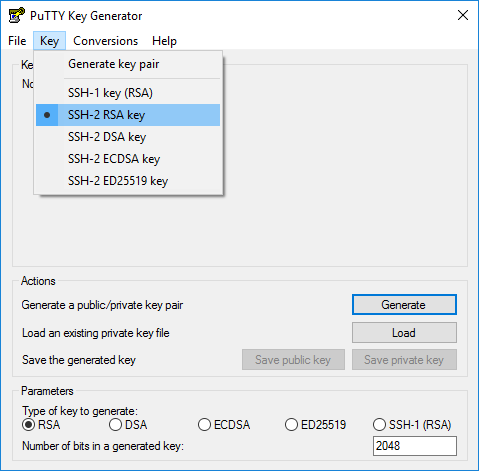Generate Ssh Key On Mac Osx
Oct 06, 2018 This guide goes through setting up SSH keys on macOS Mojave 10.14 back to Mac OSX 10.11 and also a secure password-less SSH connection between a local macOS workstation and a remote server also running a Linux variant operating system. This will step you through the process of generating a SSH keypair on Mac OS X. Begin by opening your Terminal, generally found in the 'Utilities' subdirectory of your 'Applications' directory. Generating a keypair Before you generate your keypair, come up with a passphrase. The rules for good passwords also apply here: mix of upper and lower case, numbers, spaces and punctuation. Dec 31, 2012 Using Private Keys with SSH login Without Password on Mac OS X December 31, 2012. The most daring users, simply create a public key with a empty passphrase. This introduce a security problem. If you somehow gained access to a copy of your privat key, they will gain access to all the servers that trust your key. Copy the public. Sep 09, 2019 How to configure passwordless login in Mac OS X and Linux. Generate an RSA private key using ssh-keygen (unless you have already created one). If you’re using Linux or Mac OS X, open your terminal and run the following command under your username: local$ ssh-keygen -t rsa. From the 'Conversions' menu select 'Export OpenSSH key' and save the private key file with the.pem file extension. Copy the PEM file to your Mac and set it to be read-only by your user: chmod 400 key-filename.pem Then you should be able to use ssh to connect to your remote server. Ssh -i key-filename.pem username@hostname.
This tutorial will show you how to generate and secure SSH keys on macOS Sierra (10.12) and macOS High Sierra (10.13). SSH keys allow you to log into your server without a password. They increase convenience as well as security by being significantly more resistant to brute-force attacks.
Windows 7 home premium n product key generator for microsoft office 2016. SSH (Secure Shell) is a protocol most often used for remote management and for file transfer often denoted as sFTP (Secure File Transfer Protocol). When accessing a remote server such as a Vultr VPS, it is recommended to use SSH with PKE (Public Key Exchange) which uses a key-pair where the public key is provided to the server and the private key in stored on your machine.
SSH Keys can be automatically added to servers during the installation process by adding your public keys in the Vultr control panel. You can manage your SSH keys on this page. It is important to remember that these are your public keys only (usually denoted with .pub), you should never expose your private keys.
Key types
There are several different key types that can be selected. Use the -t argument upon generation, such as ssh-keygen -t ed25519. The ED25519 key type, which uses an elliptic-curve signature, is more secure and more performant than DSA or ECDSA. Most modern SSH software (such as OpenSSH since version 6.5) supports the ED25519 key type, but you may still find software that is incompatible, thus the default key type is still RSA.
Online RSA Key Generator. Key Size 1024 bit. 512 bit; 1024 bit; 2048 bit; 4096 bit Generate New Keys Async. RSA Encryption Test. Text to encrypt: Encrypt / Decrypt. How are rsa keys generated located. My Git setup runs fine on Linux, but when I try to set things up under Windows (using Git for Windows and TortoiseGit), I don't know where to put my private SSH key (or, better still, how to tell ssh. In a number of situations security software involves the interaction between (desktop) applications and web interfaces. For (RSA) asymmetric encryption we use the C library of OpenSSL (version 1.0. Generating RSA keys The following steps are involved in generating RSA keys − Create two large prime numbers namely p and q. The product of these numbers will be called n, where n= p.q.
The default key type is 2048-bit RSA which offers good security and compatibility. For higher security, you can choose a larger key size using the -b argument on generation, such as ssh-keygen -b 4096 to create a 4096-bit RSA key pair.
Key generation
To generate an SSH key, you will need to open Terminal.app found in 'Applications > Utilities > Terminal'.
To create a 4096-bit RSA key pair, enter:
Then you will see:
Pressing Enter/Return will save your new key pair to this default location, which is recommended. You will then have the option to create a passphrase, which will encrypt the key so that it cannot be used without authorization. Using a passphrase is also recommended.
At this point, your keypair has been created and stored in ~/.ssh/id_rsa. To make the key available to the system and store the passphrase in the system keychain, we will need to complete several additional steps. Note that this is only needed if you would rather not be prompted for the key passphrase each time it is used.
Add new keypair to SSH agent
Enter ssh-add -K ~/.ssh/id_rsa. You will then be prompted for the passphrase and you will see the following:
If you would like to use this SSH key to log into a server that has already been created, you can use the ssh-copy-id tool to store the public key on the server you would like to access.
Add new key to remote server
Generate Ssh Key Git Mac Os X
Using ssh-copy-id:

Generate Ssh Key On Mac Osx Mac
The console will request your login password since the remote server is not yet aware of your key. You will see the following:
Generate Ssh Key Windows
You can now attempt to log into the remote server with ssh root@192.0.2.1 and you should be connected without a password prompt.